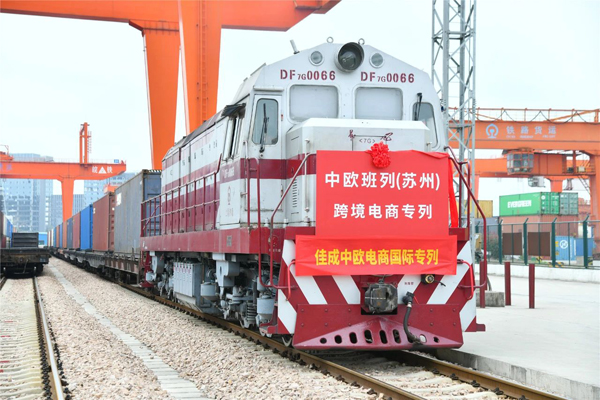
The first trains carrying cross-border e-commerce cargo heads from Suzhou to Europe on March 18. [Photo/WeChat account: snd-szgxqfb]
The first trains carrying cross-border e-commerce cargo headed from Suzhou in East China's Jiangsu province to Europe on March 18, local media outlets reported.
The cargo, which mainly consisted of textiles and household supplies, was weighed at 735,000 metric tons and valued at a total of $793,300. It will be first transported to Alataw Pass, a major land port in Xinjiang Uygur autonomous region in Northwest China, before being further delivered to European countries like Germany, France, and the Czech Republic.
As international logistics remains negatively affected by the global COVID-19 pandemic, transportation by railway has gained increasing popularity for its low costs and time efficiency.
"The new cross-border e-commerce freight trains can help local companies dispatch their goods to overseas consumers in an efficient and economical way," said Wang Liang, deputy director of HMT Cross-Border E-Commerce Co.
"We've generated over 60 million yuan ($9.22 million) in export value last year and this figure is expected to reach 200 million yuan this year."
Suzhou has also been active in bringing in cross-border e-commerce companies in recent years, as well as aims to realize deeper integration between cross-border e-commerce and the China-Europe freight trains.
Freight trains have been traveling between Suzhou and European countries for eight years, with the total cargo volume and service frequency significantly growing.
Statistics show that a total of 361 freight trains traveled between Suzhou and Europe in 2020, carrying cargo weighing 230,100 tons and valued at $1.35 billion, growing 43.1 percent and 8.24 percent year-on-year.